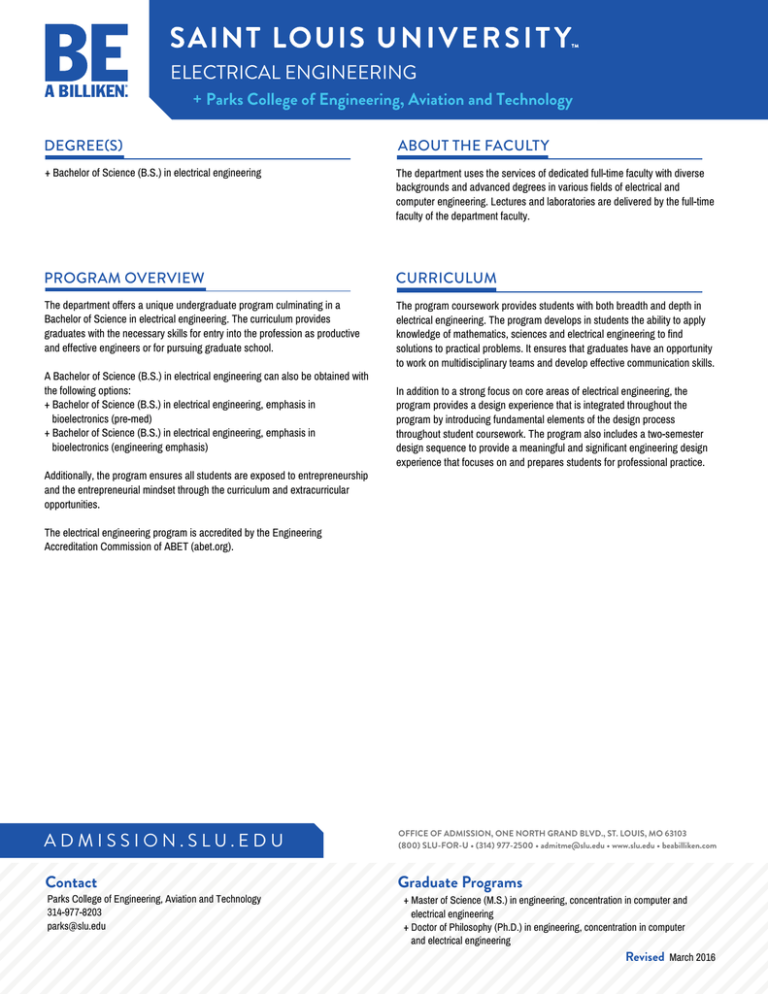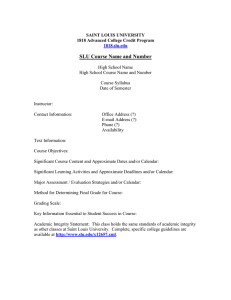electrical engineering - Saint Louis University
advertisement

ELECTRICAL ENGINEERING + Parks College of Engineering, Aviation and Technology DEGREE(S) ABOUT THE FACULTY + Bachelor of Science (B.S.) in electrical engineering The department uses the services of dedicated full-time faculty with diverse backgrounds and advanced degrees in various fields of electrical and computer engineering. Lectures and laboratories are delivered by the full-time faculty of the department faculty. PROGRAM OVERVIEW CURRICULUM The department offers a unique undergraduate program culminating in a Bachelor of Science in electrical engineering. The curriculum provides graduates with the necessary skills for entry into the profession as productive and effective engineers or for pursuing graduate school. The program coursework provides students with both breadth and depth in electrical engineering. The program develops in students the ability to apply knowledge of mathematics, sciences and electrical engineering to find solutions to practical problems. It ensures that graduates have an opportunity to work on multidisciplinary teams and develop effective communication skills. A Bachelor of Science (B.S.) in electrical engineering can also be obtained with the following options: + Bachelor of Science (B.S.) in electrical engineering, emphasis in bioelectronics (pre-med) + Bachelor of Science (B.S.) in electrical engineering, emphasis in bioelectronics (engineering emphasis) Additionally, the program ensures all students are exposed to entrepreneurship and the entrepreneurial mindset through the curriculum and extracurricular opportunities. In addition to a strong focus on core areas of electrical engineering, the program provides a design experience that is integrated throughout the program by introducing fundamental elements of the design process throughout student coursework. The program also includes a two-semester design sequence to provide a meaningful and significant engineering design experience that focuses on and prepares students for professional practice. The electrical engineering program is accredited by the Engineering Accreditation Commission of ABET (abet.org). ADMISSION.SLU.EDU OFFICE OF ADMISSION, ONE NORTH GRAND BLVD., ST. LOUIS, MO 63103 (800) SLU-FOR-U • (314) 977-2500 • admitme@slu.edu • www.slu.edu • beabilliken.com Contact Graduate Programs Parks College of Engineering, Aviation and Technology 314-977-8203 parks@slu.edu + Master of Science (M.S.) in engineering, concentration in computer and electrical engineering + Doctor of Philosophy (Ph.D.) in engineering, concentration in computer and electrical engineering Revised March 2016 ELECTRICAL ENGINEERING + Parks College of Engineering, Aviation and Technology ADMISSION REQUIREMENTS WHY CHOOSE THIS PROGRAM? In addition to the general admission and matriculation requirements of the University, Parks College engineering programs have the following additional requirements: + Students can choose a variety of tracks within the electrical engineering program, including pre-med and pre-law. + The hands-on nature of the curriculum allows electrical engineering you to see apply theoretical concepts to practical applications. Students conduct experiments in department labs during their freshman year. + The bio-electronics emphasis allows students to combine elements of electrical engineering with courses in biology, chemistry, biomedical engineering, math and others. + GPA: Minimum cumulative 3.00 high school GPA for freshmen applicants and 2.70 college GPA for transfer applicants. + ACT/SAT: ACT composite score of 24 or higher, or SAT composite score of 1100 or higher. ACT sub scores minimums of 22 in English, 24 in Mathematics, 22 in Reading Comprehension and 22 in Scientific Reasoning, or SAT Math sub score of 600. + Coursework: Fifteen total units of high school work are required: three or four units of English; four or more units of mathematics including algebra I and II, geometry and precalculus; three or four units of science including general science, introduction to physical science, earth science, biology, physics or chemistry; two or three units of social sciences including history, psychology or sociology; and three units of electives. Benefits of the electrical engineering program also include several internship and career opportunities. Students are encouraged and assisted in obtaining summer internships in local and global companies through career services. Undergraduate research opportunities within the college and National Science Foundation-sponsored research activities are available during summer or regular semesters. Students are also encouraged to seek research opportunities with faculty of the department or faculty in other departments. As an electrical engineer, there are a variety of career paths open to you, including industrial or consulting positions. Our students are also prepared for graduate and professional schools such as law, business administration or medicine. SCHOLARSHIPS AND FINANCIAL AID There are two principal ways to help finance a Saint Louis University education: + Scholarships: awarded based on academic achievement, service, leadership and financial need. + Financial Aid: provided in the form of grants and loans, some of which require repayment. Our graduates have found employment at companies and government agencies such as: + Boeing + Emerson Electric + Intel + Rockwell + Space-X + Tellabs + Texas Instruments + U.S. Air Force + And many others For priority consideration for merit-based scholarships, applicants should apply for admission by Dec. 1 and complete a Free Application for Federal Student Aid (FAFSA) by March 1. For information on other scholarships and financial aid, visit the student financial services office online at finaid.slu.edu. ADMISSION.SLU.EDU OFFICE OF ADMISSION, ONE NORTH GRAND BLVD., ST. LOUIS, MO 63103 (800) SLU-FOR-U • (314) 977-2500 • admitme@slu.edu • www.slu.edu • beabilliken.com Contact Graduate Programs Parks College of Engineering, Aviation and Technology 314-977-8203 parks@slu.edu + Master of Science (M.S.) in engineering, concentration in computer and electrical engineering + Doctor of Philosophy (Ph.D.) in engineering, concentration in computer and electrical engineering Revised March 2016


